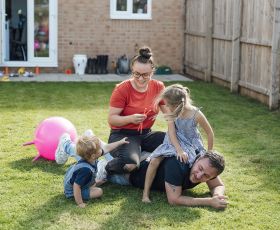There is a growing gap between what people have and what is considered to be a decent standard of living, caused in part by the cost-of-living crisis, according to the annual update of the Minimum Income Standard (MIS).
Millions of people risk falling well short of this standard, which is calculated based on what the public think is needed for an acceptable standard of living. At a time of soaring food prices and the prospect of stratospheric energy bills, our social security system is failing to provide adequate support to people struggling to get by on the lowest incomes.
The gap between incomes and MIS is particularly stark for working-age families without children who receive out-of-work benefits
Even when factoring in the Government’s cost-of-living support, the income available to a single adult without children after taxes and rent is only 32% of MIS and only 29% of MIS for a couple without children.
A couple with two children where both adults receive out-of-work benefits, is able to reach only around half (52%) of MIS when factoring in the Government’s cost-of-living support. A single parent with two children who receives out-of-work benefits can reach 54% of MIS.
While the situation is better for families in work, earning the National Living Wage (NLW) doesn’t guarantee a decent standard of living.
Overall, a single person would need to earn £25,500 a year to be able to reach MIS and ensure a decent standard of living. This is well above earnings of just £18,600 working full-time (37.5 hours a week) on the NLW. A couple with two children would need to earn £43,400 between them per year to fully reach MIS, but will only have earnings of £37,200 if both parents work full-time on the NLW.
Other key findings from this year’s MIS calculation include that the increase in earnings required for an acceptable standard of living in 2022 is the largest year on year increase across all households since the MIS research was first published in 2008.
This is partly due to inflation [3] and the substantial rise in the cost of many essentials.
Part of the increase is also due to a continued recognition of the importance of activities outside the home, which also cost more than in previous years. This may reflect when the research was carried out, which coincided with the end of prolonged periods of living under Covid-19 restrictions.
Given the ongoing uncertainty about Covid-19, all households included reusable face masks for school-aged children and adults, as well as the cost of lateral flow tests for all.
Abigail Davis, Co-Director of CRSP, and one of the authors of the latest report said:
“This report this year captures and reflects the challenging and changing times we are in. The Minimum Income Standard research continues to give us a unique way of observing and tracking the impact of these challenging times on our shared vision of acceptable living standards in the UK.
“What is clear this year is that in the face of significant social, economic and political uncertainty, the public’s views on what constitutes an acceptable minimum still emphasise the importance and value of being able to feel part of the world around you. As prices continue to rise well ahead of incomes, the reality is that more and more people are going to be focused on survival – keeping a roof over their heads, putting food on the table, and keeping their homes warm – and will fall well short of reaching this minimum living standard.”
Peter Matejic, Head of Analysis at JRF, says:
“Stratospheric energy bills are hitting poorer families extremely hard. Families on low-incomes are facing the threat of stomachs they can’t fill, homes they cannot heat and energy bills they can’t pay.
“The situation is dire for families already in extremely difficult circumstances. The Government’s cost of living support will not plug the growing gap between incomes and the amount families require to meet their minimum needs.
“In order to move us closer to a society where fewer people fall below the Minimum Income Standard, the government must reform our social security system to ensure that everyone can afford the essentials and, more broadly, what the public think is needed to live in dignity.”







